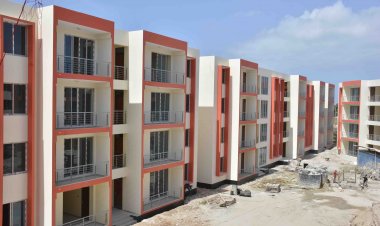5 Real Estate Investment Vehicles in Africa
With its rapidly urbanizing population, expanding middle class, and increasing investment in infrastructure, the continent offers a promising landscape for real estate investment.

Africa's real estate sector has experienced significant growth and transformation in recent years, attracting investors from around the world. With its rapidly urbanizing population, expanding middle class, and increasing investment in infrastructure, the continent offers a promising landscape for real estate investment. However, navigating the African market requires a deep understanding of the various investment vehicles available and the associated risks. Some of the key real estate investment vehicles in Africa, their benefits, and potential challenges include:
1. Real Estate Investment Trusts (REITs):
Real Estate Investment Trusts have gained popularity in several African countries, providing investors with an avenue to access real estate assets without direct ownership. REITs generate income through rental properties, commercial developments, or mortgages. Investors can benefit from regular income distributions, diversification, and liquidity by investing in REITs. However, challenges such as limited availability, regulatory frameworks, and property valuation can impact their performance.
2. Private Equity Funds:
Private equity funds play a crucial role in African real estate investment. These funds pool capital from institutional investors, high-net-worth individuals, and development finance institutions to acquire and develop real estate projects. Private equity funds often focus on large-scale developments, such as commercial buildings, residential complexes, and mixed-use projects. While they offer the potential for high returns, investors should carefully assess the fund manager's track record, investment strategy, and the local market dynamics.
3. Real Estate Development Companies:
Real estate development companies are actively involved in acquiring land, securing permits, and constructing projects across Africa. These companies leverage their project management, design, and construction expertise to develop residential, commercial, and industrial properties. Investors can participate in real estate development by partnering with established companies or investing directly in specific projects. However, risks associated with construction delays, cost overruns, and regulatory challenges require careful due diligence.
4. Real Estate Crowdfunding:
Real estate crowdfunding platforms have emerged as an alternative investment vehicle in Africa. These platforms connect real estate developers with individual investors, allowing them to participate in specific projects with relatively small amounts of capital. Crowdfunding offers accessibility, diversification, and the opportunity to invest in a variety of real estate projects across different African markets. However, investors should be cautious of the platform's reputation, project selection process, and risk management practices.
5. Real Estate Investment Clubs:
Real estate investment clubs bring together like-minded investors to pool resources and expertise for joint investments. These clubs offer a platform for networking, sharing knowledge, and accessing investment opportunities that individual investors may not have access to. Members can collectively invest in properties, land, or real estate projects, aiming for shared returns. However, effective governance, transparency, and alignment of interests among club members are crucial for successful outcomes.
Africa's real estate sector presents compelling investment opportunities for both local and international investors. By understanding the various investment vehicles available, investors can navigate the complexities and capitalize on the continent's growth potential. Whether through REITs, private equity funds, real estate development companies, crowdfunding platforms, or investment clubs, careful due diligence, risk assessment, and knowledge of the local market dynamics are essential for successful real estate investments in Africa. As the continent continues to evolve, these investment vehicles will play a significant role in shaping its real estate landscape.
If you have a real estate press release or any other information that you would like featured on African Real Estate Blog Post do reach out to us via email at [email protected]
























![7 Famous Architectures in Africa [PHOTOS]](https://realestateblogpost.com/uploads/images/2023/05/image_380x226_646c9c2bd8642.jpg)








